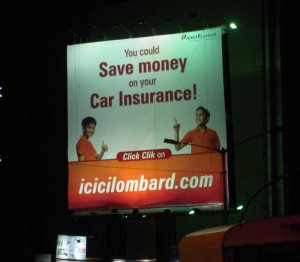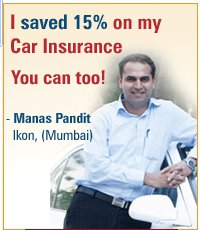You may have seen the latest update in ICICI Lombard’s ‘Click Clik’ campaign; I have.
 It started with just 2 kids in the billboard (and print ads). The kids, not in line for a driving license at least in the next 5+ years were telling us, ‘Save money on your car insurance’. (Photo from Network2Media)
It started with just 2 kids in the billboard (and print ads). The kids, not in line for a driving license at least in the next 5+ years were telling us, ‘Save money on your car insurance’. (Photo from Network2Media)
But since this post is not about the kids’ age and their appropriateness in selling car insurance, let’s move on to the next stage of the campaign. The current one has people, with name and city below them explaining how they saved money via ICICI Lombard, on car insurance. I have seen 2 in Infantry Road outside my office and both have Bangalore-based people in them.
I’m sure other cities will have local people in them.
The other example is LIC, which has a similar campaign that names people, but not with their cities, but with their designations. And in LIC’s case, the selected people seem to be slightly better known, unlike complete strangers in case of ICICI Lombard. See, for instance, this TVC starring a reasonably known South Indian actor named Ganesh Venkatraman.
And I’m sure you have seen this tactic being used for ages. Using complete strangers to testify the quality of a product or a service is nothing new. It started with using celebrities, since their voice had some weight, but then, brands started using total strangers too. From that perspective, ICICI Lombard using city-centric strangers is interesting.
The question, however, is this: Regardless of the fact that the stranger in the billboard is from Bangalore, isn’t he/she still a stranger?
I understand ICICI Lombard wants me to take a look at the perceived benefit gained by that stranger than the stranger (model?) himself/herself. If that’s the case, why bother adding the name and city of that model? What makes brands assume that I may listen better/may seem keen if there’s a name and city listed below the model selling me that insurance package?
Is it the fact that something like insurance has traditionally been sold one-to-one and that human connect helps? These days, with online purchases, that may have changed, but I assume that personal connect is one of the reasons why brands include the name/city/profession of people modeling for things like insurance communication.
So, how well does a stranger sell insurance to you? Is the logic, “I’m from Bangalore. A guy from Bangalore selling car insurance would make me buy it too”?. Does that work?
I have seen the same ad on Facebook too and there, it looks even more jarring, at least to me. Here’s a lady, with name and city, telling me she saved Rs. 900 on insurance. I could choose to go by the ‘Rs. 900 savings’ message and be impressed, or I could go on questioning what that stranger is doing selling me insurance…like in this post. The reason I’m asking is simply this – don’t platforms like Facebook allow hyper-targeting?
Is there an opportunity for brands to use that level of hyper-targeting for better impact? This campaign on billboards makes sense, but on Facebook, I suppose there would be better options. For instance, is there a possibility to offer an incentive to existing ICICI Lombard car insurance holders with Facebook accounts to,
(a) talk about how good it is on Facebook (sponsored update?)
(b) use their testimonial for hyper-targeted ad only to their friends, resulting in a possible personalized recommendation?
The first one would seem like a flagrant misuse of a personal space, at first, but, like this clever and flagrant misuse of Indian Railways’ public address system by Bingo potato chips…
…I suppose a natural mechanism of feedback and protest would deal with the possible impact. If I find someone selling me insurance on Facebook, via his/her status update, I could assume it was a natural reaction and not question their intent. If the person is really bothered about it, he/she may add a disclaimer that they were incentivized to do it, like the new FTC (in the US) guidelines suggest.
The second one is a plain form of advertising; it is only targeted better and deeper. The kind of inventory that a brand needs to build here is massive, unlike the 4-5 generic ones they do for normal advertising, but it may possibly work better given how they truly bring the personal angle that the billboard so desperately tries to bring.
Thoughts?

